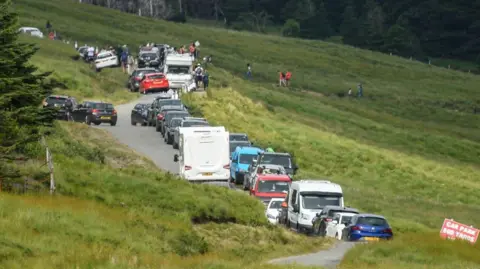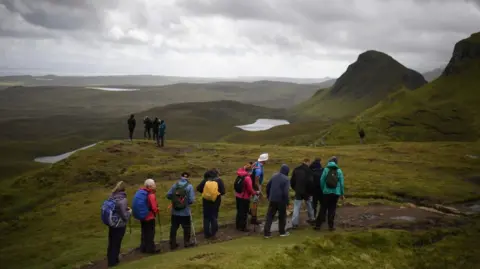Parking fines soar in Skye tourist site crackdown
 Getty Images
Getty ImagesTraffic wardens brought in to tackle problem parking at Skye's tourist hot-spots issued fines worth more than £400,000 last year, according to Highland Council.
Visitors to the island made up a "significant proportion" of those people served with the £50 penalty charge notices (PCNs), the local authority confirmed.
A total of 7,011 parking penalties were issued in 2024 - more than double the 2,784 served to motorists in 2020, according to another set of council statistics.
Poor parking has been a long-standing problem on Skye, with cars and other vehicles often abandoned at the roadside or parked illegally in passing places near attractions such as the Fairly Pools and the Quiraing.
Public money has been invested in car parks, but rule-breaking has left Highland Council chasing up on thousands of PCNs.
There were 2,797 penalties issued in 2021, 3,545 in 2022 and 5,563 in 2023.
Already this year more than 2,670 have been issued up to May.
 Getty Images
Getty ImagesFines totalling £430,000 were issued in the most recent financial year - April 2024 to March this year - according to figures reported the council's Skye and Raasay committee.
Tourist hotspots had some of the highest numbers.
At a car park at The Storr 948 PCNs totalling £56,350 were issued, while 184 notices with a total value of £10,250 for roadside parking were given out at the Fairy Pools.
Highland Council told BBC Scotland News several factors were behind the rise over the last five years.
They included there being more regulated parking areas and no waiting restrictions, as well as an increase in enforcement officers.
But a spokesperson added: "A number of areas that generate high PCN numbers are around key visitor locations, and it is likely that a significant proportion of the PCNs issued on Skye are visitors at these locations.
"Parking rule-breaking is a concern and the seriousness of this can depend on the area and frequency.
"In many areas, it can cause safety issues, block traffic, and create challenging situations for pedestrians and drivers."
The council said the public could report parking issues on its website.
How much are the fines?
PCNs can be issued for a number of reasons, such as an unpaid parking charge or parking in a disabled space without having a valid Blue Badge.
Fines cost £50 but can rise to £150, plus a sheriff officer's charge, if not paid after 70 days.
People have the right to challenge a PCN.
A report to the local authority's Isle of Skye and Raasay committee said on average 70% of parking debts were collected.
In some cases it could be years before a fine is paid.
The latest figures show the worst offending last year was at Portree's Bayfield (West) car park where there were 1,346 PCNs issued totalling £81,850.
Tariffs at the site range from £2 for three hours and £4 for up to 12 hours.
A separate set of Highland Council figures, show the local authority issued about £1.3m-worth of PCNs for the whole Highland region last year.
It was the highest figure since the council started recording the data in 2016.
So far, £877,556 of those fines have been collected and £221,552 cancelled or written off.
Most PCNs were issued in Inverness, followed by Skye and then Lochaber.
Scottish Tourism Alliance chief executive, Marc Crothall, said tourists made a "significant contribution" to island economies.
He said total tourism spend in Scotland last year was £10.5bn and this helped to support local shops, pubs, restaurants, and 245,000 jobs across the country.
Mr Crothall said: "Many of those who visit and stay in rural destinations also donate to good causes too."
He added: "Sustainable and responsible tourism is one of the pillars of the national tourism strategy, Scotland Outlook 2030.
"We would encourage all visitors to be considerate when visiting our destinations, avoiding causing unnecessary pressure on our roads and the areas around our beauty spots and to be considerate of those who live in the local communities."
